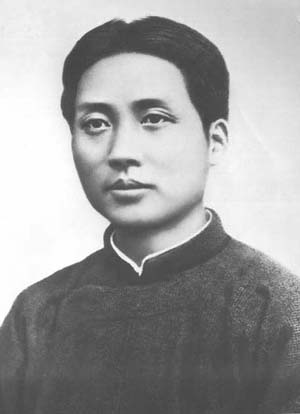|
Peasant Movement Training Institute At Guangzhou
The Peasant Movement Training Institute or Peasant Training School was a school in Guangzhou (then romanized as "Canton"), China, operated from 1923 to 1926 during the First United Front between the Nationalists and Communists. It was based in a 14th-century Confucian temple. The site now houses a museum to Guangzhou's revolutionary past. History The PMTI was one of the outcomes of the First United Front between the Kuomintang (KMT or Nationalist Party) and the Chinese Communist Party (CCP) during early-mid-1920s. In 1923, the KMT-CCP Alliance had been formed. The KMT was then led by Sun Yat-sen and carried out the policies of “alliance with Soviet Russia, cooperation with the Communists, and assistance to peasant and worker movements”. In 1924, Peng Pai (), one of the leaders of the CCP at its early stage, became a member of KMT and served as the Secretary of Peasant Department of KMT Central Committee. Based on Peng Pai’s idea and suggestion, the KMT Central Committe ... [...More Info...] [...Related Items...] OR: [Wikipedia] [Google] [Baidu] |
Guangdong
Guangdong (, ), alternatively romanized as Canton or Kwangtung, is a coastal province in South China on the north shore of the South China Sea. The capital of the province is Guangzhou. With a population of 126.01 million (as of 2020) across a total area of about , Guangdong is the most populous province of China and the 15th-largest by area as well as the second-most populous country subdivision in the world (after Uttar Pradesh in India). Its economy is larger than that of any other province in the nation and the fifth largest sub-national economy in the world with a GDP (nominal) of 1.95 trillion USD (12.4 trillion CNY) in 2021. The Pearl River Delta Economic Zone, a Chinese megalopolis, is a core for high technology, manufacturing and foreign trade. Located in this zone are two of the four top Chinese cities and the top two Chinese prefecture-level cities by GDP; Guangzhou, the capital of the province, and Shenzhen, the first special economic zone in the count ... [...More Info...] [...Related Items...] OR: [Wikipedia] [Google] [Baidu] |
Sun Yat-sen
Sun Yat-sen (; also known by several other names; 12 November 1866 – 12 March 1925)Singtao daily. Saturday edition. 23 October 2010. section A18. Sun Yat-sen Xinhai revolution 100th anniversary edition . was a Chinese politician who served as the first provisional president of the Republic of China and the first leader of the Kuomintang (Nationalist Party of China). He is called the "Father of the Nation" in the Republic of China, and the "Forerunner of the Revolution" in the People's Republic of China for his instrumental role in the overthrow of the Qing dynasty during the Xinhai Revolution. Sun is unique among 20th-century Chinese leaders for being widely revered in both Mainland China and Taiwan. Sun is considered to be one of the greatest leaders of modern China, but his political life was one of constant struggle and frequent exile. After the success of the revolution in 1911, he quickly resigned as president of the newly founded Republic of China and relinquished ... [...More Info...] [...Related Items...] OR: [Wikipedia] [Google] [Baidu] |
Major National Historical And Cultural Sites In Guangdong
Major (commandant in certain jurisdictions) is a military rank of commissioned officer status, with corresponding ranks existing in many military forces throughout the world. When used unhyphenated and in conjunction with no other indicators, major is one rank above captain, and one rank below lieutenant colonel. It is considered the most junior of the field officer ranks. Background Majors are typically assigned as specialised executive or operations officers for battalion-sized units of 300 to 1,200 soldiers while in some nations, like Germany, majors are often in command of a company. When used in hyphenated or combined fashion, the term can also imply seniority at other levels of rank, including ''general-major'' or ''major general'', denoting a low-level general officer, and ''sergeant major'', denoting the most senior non-commissioned officer (NCO) of a military unit. The term ''major'' can also be used with a hyphen to denote the leader of a military band such as i ... [...More Info...] [...Related Items...] OR: [Wikipedia] [Google] [Baidu] |
Tourist Attractions In Guangzhou
Tourism is travel for pleasure or business; also the theory and practice of touring, the business of attracting, accommodating, and entertaining tourists, and the business of operating tours. The World Tourism Organization defines tourism more generally, in terms which go "beyond the common perception of tourism as being limited to holiday activity only", as people "travelling to and staying in places outside their usual environment for not more than one consecutive year for leisure and not less than 24 hours, business and other purposes". Tourism can be domestic (within the traveller's own country) or international, and international tourism has both incoming and outgoing implications on a country's balance of payments. Tourism numbers declined as a result of a strong economic slowdown (the late-2000s recession) between the second half of 2008 and the end of 2009, and in consequence of the outbreak of the 2009 H1N1 influenza virus, but slowly recovered until the COVID-19 pa ... [...More Info...] [...Related Items...] OR: [Wikipedia] [Google] [Baidu] |


